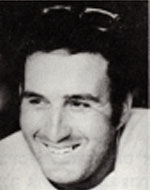Jacob, son of Hannah and Yehuda, was born on the 18th of Sivan 5707 (June 6, 1947) in Kibbutz Amir in the Upper Galilee. The large families of his parents perished in the Holocaust, so his name was named Jacob – after his mother’s father, who fell from a Nazi bullet in the Warsaw ghetto. His growth brought his parents a little consolation. About a year after his birth, the War of Independence broke out, and he and the rest of the children of the Upper Galilee went to Hadera, which was relatively safe. He studied at the AD Gordon High School in Tel Aviv and continued at the Amal High School in Kiryat Shalom, where he received his high school diploma from the Ankori High School in Tel Aviv, He was educated in a spirit of pioneering, in the spirit of the values of labor settlement, and despite his childhood and adolescence, he spent his entire life connected to the land, the open spaces and the landscape. The love of the land and the people was an inseparable part of his personality, and impressed his profound impression on his way of life and behavior. He led the Hashomer Hatzair movement, from there to the Nahal and the Nahal, to Kibbutz Nirim, a settlement in front of the Gaza Strip, and served as a counselor in the northern branch of Tel Aviv. Yaakov was drafted into the IDF at the end of September 1966, and volunteered for the paratroop Nahal Brigade, where he underwent various courses as part of the Nahal Brigade’s conversion to the Armored Corps, including a course for drivers and a 20mm artillery team. Additional courses in infantry. He successfully completed the course for the operators of a machine gun and a sabotage course. Finally, in light of his success in the course, he was assigned the profession of sabotage as a major subject. During the Six-Day War he participated as a regular soldier on the southern front. At the end of his military service, Yaakov returned to Kibbutz Nirim. In his work in the fields of the farm, he found peace in his soul, and his life was fulfilled in his life. There he married Erela, where their daughter Deganit was born. In November 1971, when he was working in the fields of the farm, his tractor mounted on a mine, but miraculously he was not hurt. (This case was written in the weekly supplement of Ma’ariv, “Days and Nights” on June 30, 1972, on pages 26-25). During the Yom Kippur War, Yaakov participated in battles in the Sinai, as a patrol in the Armored Corps. On October 17 he crossed the canal with General Eden’s division. The next day, on Simchat Torah, October 18, 1973, when they encountered an Egyptian commando compound well entrenched in the Abu Sultan camps, a sniper was hit by a sniper bullet while covering his comrades with a machine gun. “He was left behind by a wife, daughter, parents and sister, who was buried in the temporary cemetery in Bari, and in August 1974 he was transferred to the cemetery at Kibbutz Nirim. His parents were laid to rest at the military cemetery in Kiryat Shaul, and his name was engraved on the memorial plaque for the fallen students of the school, and a monument was erected by the students in the Holtz vocational school In memory of all the fallen in the Israeli army, and in Kibbutz Nirim a memorial park was erected in the olive grove in the farm.
